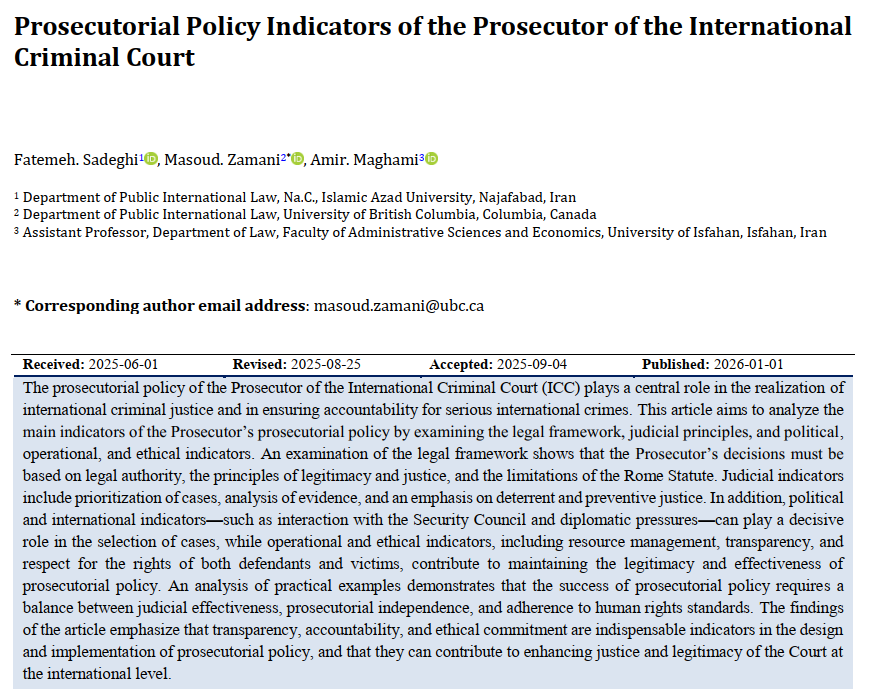Prosecutorial Policy Indicators of the Prosecutor of the International Criminal Court
Keywords:
Prosecutorial Policy of the Prosecutor, International Criminal Court, Legal and Judicial Indicators, International Criminal Justice, Transparency and AccountabilityAbstract
The prosecutorial policy of the Prosecutor of the International Criminal Court (ICC) plays a central role in the realization of international criminal justice and in ensuring accountability for serious international crimes. This article aims to analyze the main indicators of the Prosecutor’s prosecutorial policy by examining the legal framework, judicial principles, and political, operational, and ethical indicators. An examination of the legal framework shows that the Prosecutor’s decisions must be based on legal authority, the principles of legitimacy and justice, and the limitations of the Rome Statute. Judicial indicators include prioritization of cases, analysis of evidence, and an emphasis on deterrent and preventive justice. In addition, political and international indicators—such as interaction with the Security Council and diplomatic pressures—can play a decisive role in the selection of cases, while operational and ethical indicators, including resource management, transparency, and respect for the rights of both defendants and victims, contribute to maintaining the legitimacy and effectiveness of prosecutorial policy. An analysis of practical examples demonstrates that the success of prosecutorial policy requires a balance between judicial effectiveness, prosecutorial independence, and adherence to human rights standards. The findings of the article emphasize that transparency, accountability, and ethical commitment are indispensable indicators in the design and implementation of prosecutorial policy, and that they can contribute to enhancing justice and legitimacy of the Court at the international level.
Downloads
References
Bådagård, L., & Klamberg, M. (2016). The Gatekeeper of the ICC - Prosecutorial Strategies for Selecting Situations and Cases at the International Criminal Court. Georgetown Journal of International Law, 48(1).
Bassiouni, M. C. (2010). The Pursuit of International Criminal Justice: A World Study on Conflicts, Victimization, and Post-Conflict Justice. Martinus Nijhoff Publishers.
Broomhall, B. (2003). International Justice and the International Criminal Court: Between Sovereignty and the Rule of Law. Oxford University Press.
Brubacher, M. R. (2004). Prosecutorial Discretion within the International Criminal Court. Journal of International Criminal Justice, 2(1).
Cryer, R. (2019). Prosecuting International Crimes: Selectivity and the International Criminal Court. Cambridge University Press.
Cryer, R., Friman, H., Robinson, D., & Wilmshurst, E. (2010). An Introduction to International Criminal Law and Procedure. Cambridge University Press.
Davis, C. (2025). Prosecutorial Discretion in International Criminal Justice. Edward Elgar.
Dutton, Y. (2013). Rules, Politics, and the International Criminal Court: Committing to the Court. Routledge.
Greenawalt, A. K. (2007). Justice without Politics? Prosecutorial Discretion and the International Criminal Court. New York University Journal of International Law and Politics, 39(3).
Heller, K. J. (2011). The Complementarity Conundrum: The ICC and National Courts. Michigan Journal of International Law, 32(2), 345-412.
Heller, K. J., & Nesi, G. (2016). The International Criminal Court: Operational Challenges and the Role of the Prosecutor. Cambridge University Press.
Hillebrecht, C. (2014). Domestic Politics and International Human Rights Tribunals: The Problem of Compliance. Cambridge University Press.
Hoffman, M. (2011). Deterrence and the International Criminal Court. Leiden Journal of International Law, 24(3), 563-587.
Kerr, R. (2017). Political Constraints and Prosecutorial Decision-Making at the ICC. Journal of International Criminal Justice, 15(2), 299-321.
Klamberg, M. (2013). Evidence in International Criminal Trials. Brill.
Kotecha, B. (2020). International Criminal Court’s Selectivity and Procedural Justice. Journal of International Criminal Justice, 18(1).
Łągiewska, M. (2024). Digitalization and the Use of New Technologies in International Arbitration. Brill.
Lovat, H. (2011). Prosecutorial Discretion and the Rome Statute of the International Criminal Court. ExpressO, 3(1).
Nartey, E. (2021). Accountability and Corporate Human Rights Violations in Tort and Internatinal law. Cambridge University Press.
Schabas, W. A. (2017). The International Criminal Court: A Commentary on the Rome Statute. Oxford University Press.
Scharf, M. P. (2010). The ICC and the Future of International Criminal Justice. American Journal of International Law, 104(3), 505-533.
Stahn, C. (2008). The Law and Practice of the International Criminal Court. Oxford University Press.
Stahn, C. (2010). Collecting Evidence in Conflict Zones: Challenges for the ICC Prosecutor. Leiden Journal of International Law, 23(4), 823-850.
Stahn, C. (2015). International Criminal Justice and Operational Constraints: Balancing Resources and Priorities. Journal of International Criminal Justice, 13(5), 1023-1045.
Stahn, C. (2019). A Critical Introduction to International Criminal Law. Cambridge University Press.
Steinberg, R. H. (2020). The International Criminal Court: Contemporary Challenges and Reform Proposals. Brill.
van den Herik, L. (2008). Prosecutorial Discretion at the International Criminal Court: Between Law and Politics. Martinus Nijhoff Publishers.
Van Schaack, B. (2011). Prosecutorial Ethics and Human Rights in International Criminal Law. Journal of International Criminal Justice, 9(4), 787-812.
Weisbord, N. (2025). The Crime of Aggression: The Quest for Justice in an Age of Drones, Cyberattacks, Insurgents, and Autocrats. Princeton University Press.

Downloads
Additional Files
Published
Submitted
Revised
Accepted
Issue
Section
License
Copyright (c) 2025 Fatemeh Sadeghi, Masoud Zamani, Amir Maghami (Author)

This work is licensed under a Creative Commons Attribution-NonCommercial 4.0 International License.





